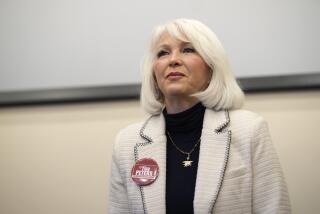Carmony Pleads Guilty in Baugh Campaign Case
SANTA ANA — Rather than face retrial for her part in a scheme to help state Assemblyman Scott Baugh win election two years ago, GOP activist Rhonda Carmony pleaded guilty Thursday to two felony charges, which were immediately reduced to misdemeanors.
Carmony, 27, the wife of Rep. Dana Rohrabacher (R-Huntington Beach), was sentenced to three years’ probation and 300 hours of community service and was fined $2,800. Carmony, who is her husband’s campaign manager, also pledged not to contact voters or engage in other electoral activities unless it was on behalf of Rohrabacher, 50. Her record will carry no felony.
Carmony helped recruit and place on the ballot a decoy candidate to split the Democratic vote and ensure the election of Baugh, a Rohrabacher protege, to the Assembly in 1995, according to testimony in her June trial. It ended in a hung jury, with two jurors holding out for acquittal.
She was charged with conspiracy and fraudulently filing and making nomination papers on behalf of Laurie Campbell, the decoy candidate.
“It was time to put an end to this,” Carmony said in a statement that also attacked Dist. Atty. Michael R. Capizzi for spending “millions of dollars to gain a guilty plea to misdemeanor violations of collecting one signature improperly on a single nomination petition.”
It is the second time in five weeks that Carmony has pleaded guilty in an election fraud case. In the previous instance, she pleaded guilty to one misdemeanor and was fined $13,500 for failing to file campaign finance reports in 1992 for a committee that paid for a mailer attacking a Diamond Bar council candidate.
Capizzi, also a Republican, rejected charges from Carmony and Rohrabacher that his office had wasted taxpayers’ money in pressing the prosecution. He also criticized her for trying to minimize her role in the Campbell affair and the Diamond Bar case.
“She has pleaded guilty to a serious crime that constitutes a serious fraud, not only on the other candidates in that race but on the voters,” he said. “Both these cases were attempts to defraud the voters and the public, and in both instances she indicated she willfully and unlawfully violated the law. And then she goes out and tries to backpedal from that. Is this a fraud on the court?”
The heated rhetoric underscored the antagonism between Rohrabacher and Capizzi that has raged since the district attorney’s office began its investigation of the 1995 special recall election. In that contest, voters recalled renegade Republican Doris Allen and replaced her with Baugh (R-Huntington Beach), which gave the GOP control of the Assembly for the first time in 25 years.
The investigation led to guilty pleas from three other GOP activists for helping place Campbell on the ballot by falsifying her nominating papers. It is not a crime to place a decoy candidate on the ballot, but the four GOP aides admitted to falsifying nomination papers to help Campbell, a longtime friend of Baugh, become a candidate.
Baugh has been charged with two felony perjury counts and 10 misdemeanor violations of the Campaign Reform Act. He is accused of falsifying campaign reports to hide a contribution from Campbell. The Municipal Court judge at his preliminary hearing gave lawyers until Dec. 23 to seek a resolution that would avoid a trial.
Rohrabacher, who left the courtroom for a TV appearance shortly before Carmony pleaded guilty, charged Capizzi with abuse of office and attempting to use the prosecution to advance a run for attorney general.
“He thought he would show he is a bipartisan tough guy,” he said. “It is part of his strategy to be attorney general, then governor, then president. This is a man who has grandiose ideas about himself.”
The pleas ended a week of fevered negotiations in which Carmony lawyer Creighton Laz sought to craft a way for his client to plead guilty without having a felony on her record. While prosecutors did not oppose sentencing her for misdemeanors, they declined to reduce the felony counts.
Superior Court Judge Francisco Briseno solved that problem after three closed-door meetings Thursday, when he agreed to announce prior to the pleading that he would consider the matters “misdemeanors for all purposes” and subsequently sentence them that way.
While Briseno did not have the power to reduce the charges to misdemeanors until sentencing, that satisfied the defense.
Briseno also barred Carmony from running for elective office for three years. She previously has served on the GOP Central Committee, an elective office.
Carmony pleaded guilty to fraudulently making and fraudulently filing Campbell’s nomination papers. The conspiracy charge was dismissed.
Briseno declared the violations “serious matters” and said the lengthy trial had acted as a deterrent.
“These laws are necessary to protect the electorate. . . . It is understood that members of the political community must adhere to the highest standards,” the judge said.
In arguing for a stiffer sentence, Deputy Dist. Atty. John Anderson indicated that Campbell might be prosecuted for felonies. Campbell two years ago agreed to cooperate with prosecutors and, in exchange, was told she would face only misdemeanors.
Anderson said that Campbell “has breached that agreement” by being “untruthful” in testimony both in the Carmony case and at the Baugh preliminary hearing.
“Laurie Campbell has chosen not to cooperate and is subject to felony prosecution,” he said.










